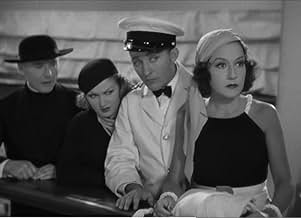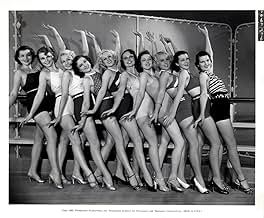Añade un argumento en tu idiomaYoung man falls for blonde heiress forced onto ship. Follows to rescue her, disguising as mobster's aide when realizing she's returning home and his boss is aboard.Young man falls for blonde heiress forced onto ship. Follows to rescue her, disguising as mobster's aide when realizing she's returning home and his boss is aboard.Young man falls for blonde heiress forced onto ship. Follows to rescue her, disguising as mobster's aide when realizing she's returning home and his boss is aboard.
- Dirección
- Guión
- Reparto principal
- Premios
- 3 premios en total
- Federal Man
- (sin acreditar)
- Ling
- (sin acreditar)
Reseñas destacadas
They throw out all but four of the original songs and turn the film into a Bing Crosby vehicle by getting a group of songwriters to write several new songs especially for him, one of them reportedly at his request. Then, they rewrite the lyrics to "You're the Top" (one of Porter's most clever songs), retain only the first verse of the title song, "Anything Goes", make a minor change (required by the censors of the time) to the lyrics to "I Get A Kick Out Of You", keep the original plot line (notice that the filmmakers considered the ridiculous plot sacred enough to leave alone, but not Cole Porter's songs), and release this flat, unfunny mess. At least Ethel Merman fans get to see her sing two of her biggest hit songs on film.
The title song remains as does "You're the Top." The rest are forgettable. This is such a mishmash of comedy schtick and bad plotting that's it's useless to follow the plot, but Crosby and Merman are breezy and fun. Ruggles does a blatant and bad impression of Vistor Moore (who played the part on Broadway), Lupino and Treacher are fun.
Funniest bits have Crosby needing a beard for a disguise when a dog walks by.... Merman also stars in the big Chinese production number as the boat docks! As I said, a very odd film. Jane Wyman is one of the chorus girls.
However, that doesn't mean you should ignore this revamped film version, which has historical interest because it preserves one of the few film performances of Ethel Merman. The Broadway show, which opened in 1934 and ran for 420 performances (quite a long run in those days), actually gets better treatment than other Porter musicals adapted for film. I have in mind "DuBarry was a Lady," the 1943 vehicle that stars Lucille Ball, Gene Kelly and Red Skelton, and "Something for the Boys" (1944).
"Anthing Goes," which was renamed "Tops Is the Limit" to prevent confusion with the 1956 remake, again starring Bing Crosby, is more of a vehicle for Crosby than anyone else, which is why outside songwriters were brought in to provide him with material more suited to his vocal skills.
Only three of Porter's songs are given anything resembling a full treatment (albeit with laundered lyrics): "You're the Top," "I Get a Kick Out of You" and "There'll Alway Be a Lady Fair." Other songs are used as background or underscoring (e.g., "All Through the Night," "Blow, Gabriel, Blow.").
In the original cast, Merman was joined by two big Broadway stars -- William Gaxton and Victor Moore -- as well as a lady named Vivian Vance, while the film gives us, besides Crosby and Merman, Charles Ruggles, Ida Lupino and the veddy, veddy English Arthur Treacher.
The plot, such as it is, hardly matters. In her autobiography "Who Could Ask for Anything More," Ethel Merman tells why:
" ...the writers who used to think up the books that were wrapped around Gershwin or Cole Porter scores, started from scratch, which only their bare cupboards and an unmanageable sense of humor to guide them. First a producer signed a cast; then he hired writers to rustle up some material for that cast to use. 'I've got Bert Lahr,' he'd say. Or 'I've got Victor Moore. Get going' buddy. Make with the Moore-type yoks.' " In the mid-1950s, Merman and Frank Sinatra performed in "Anything Goes" on television. The program was later released on a bootleg album. If enjoy the film, with a little research you'll even find it on DVD.
Enjoy the hijinks, singing and production numbers.
This first version of Anything Goes was no exception. All the naughty lyrics and risqué situations and dialog were cut out to make this product G rated. It wasn't until Kiss Me Kate was done in the 1950s that a really successful adaption of one of Cole Porter's Broadway shows was done. The best success Porter had on the screen was when he wrote directly FOR the screen. Born to Dance, Rosalie, High Society, etc.
What this Anything Goes has to recommend it was the fact that this was only one of two instances where Ethel Merman reprised one of her Broadway successes for the screen. At that she sung some G rated lyrics for the title song and I Get A Kick Out of You.
The only thing that Bing Crosby got to do in the movie that was from Cole Porter was a duet with Ethel Merman with You're the Top. If I had to nominate a song in history that's had more lyrics done for it would have to be this one. The melody is eternal and the lyrics are constantly being updated. Someone ought to investigate the Cole Porter estate and see just how many verses he actually wrote to You're the Top. Surely there haven't been any since 1964, but you can hear versions of You're the Top even today with up to date topical lyrics:
You're the Top, you're Madonna's reinvention
You're the Top, you're Bush's stolen election
Now I just made that up, but it's a tribute to a great songwriter and an eternal melody.
A whole bunch of Hollywood songwriters gave Bing Crosby some serviceable tunes for him, but it ain't Cole Porter. I think this has to do with the family image that Crosby had even back then. No naughty Cole Porter lyrics for Der Bingle.
Yet he has some moments with songs. I particular like the number he does from the ship's crow's nest, Sailor Beware. Good song, but it's a typical example of the cheap production numbers that Paramount gave Crosby at this time. If you look at it, try to imagine what Busby Berkeley would have done. He also has a nice ballad to sing to Ida Lupino in My Heart and I. Finally there's a song called Moonburn which sold a few 78 rpm platters back in the day. On record Crosby sings it with just the accompaniment of jazz pianist Joe Sullivan. It's classic Bing.
Charlie Ruggles was never bad in anything he did, but I do kind of wish that Victor Moore reprised his part from Anything Goes. He was a big hit on Broadway as squeamish Public Enemy 13, Moonface Martin.
Ida Lupino gives very little indication of the classic actress she became on screen. But she's serviceable as Bing's love interest.
Look at the trio of sailors singing, They'll Always Be a Lady Fair and you'll recognize Chill Wills.
Add to that a badly butchered job in editing and you haven't got one of Bing Crosby's best films, but still enjoyable for fans of Der Bingle like your's truly.
The story opens in a cabaret where American entertainer Reno Sweeney (Ethel Merman) is performing the very night she is to set sail over to London. She loves Billy Crocker (Bing Crosby), an ambitious young man whose boss has left him in charge while away on vacation. As Reno is performing, Billy notices an attractive young girl (Ida Lupino) sitting at another table who appears to be depressed or in some kind of trouble. Moments later, a couple of men (Edward Gargan and Matt McHugh), actually hired detectives, take her away. Fearing she's being abducted against her will, Bill attempts to rescue this damsel in distress, but takes the advise of the men to mind his own business. While on the dock bidding Reno bon voyage, Billy sees the young damsel (actually Hope Harcourt, a runaway heiress being taken back to her family in England by Evelyn Oakleigh (Arthur Treacher) to marry a man she doesn't love) boarding the same ship, and rushes on moments before its departure. While on board, Billy disguises himself to keep from being recognized by his employer (Robert McWade) and avoid arrested as a stowaway. Aside from following Miss Harcourt, who has taken a liking to Billy during the ocean voyage, he joins forces with con man "Moonface" Martin (Charlie Ruggles), Public Enemy No. 13, masquerading as a clergyman, accompanied by Bonnie (Grace Bradley). Because of Billy's association with Moonface, Hope mistakes him for or a notorious gangster and avoids him after he and Martin are arrested and placed in the brig.
A Cole Porter score with much from the play discarded ("All Through the Night" is underscored), and new ones composed by others, the motion picture soundtrack to the final cut is as follows: "Anything Goes" (briefly sung by Ethel Merman during opening credits); "I Get a Kick Out of You" (sung by Merman); "There'll Always Be a Lady Fair" (sung by Chill Wills and the Avalon Boys); "Sailor Beware" (by Richard Whiting and Leo Robin/ sung by Bing Crosby); "There'll Always Be a Lady Fair" (reprise/Avalon Boys); "Moon Burn" (by Hoagy Carmichael and Edward Heyman/ sung by Crosby); "My Heart and I" (by Frederick Hollander/ sung by Crosby to Lupino); "You're the Tops" (sung by Merman and Crosby); "Shanghai-de-Ho" (by Hollander and Robin/ sung By Merman): and "You're the Tops" (reprise by Crosby and Merman). With much of the songs worked within the contest of the plot, only two are given the production treatment "I Get a Kick Out of You" with Merman sitting in a ring shaped carrier suspended from the ceiling in the cabaret sequence; and the finale "Shanghai De-Ho" performed by Merman dressed in Oriental costume for the Paramount news reel set in England during a rainy afternoon. The Crosby and Merman duet of "You're the Tops" is tops, even with its dated lyrics and in-jokes that might not be understood by today's generation. The humor from that same number predates those 1940s "Road" comedies starring Crosby and Bob Hope where Merman briefly sings in Crosby's voice and Crosby hers.
For anyone familiar with Ida Lupino's dramatic movie career that took off in the 1940s, and her directorial work shortly afterwards, may be surprised seeing this brunette a blonde appearing in a musical. This would be one of her rare opportunities in which the British-born actress would portray a character of her true heritage on the American screen. Others in the cast include: Margaret Dumont (taking time away from The Marx Brothers) as Mrs. Wentworth; Richard Carle as Bishop Henry Dobson; among others.
ANYTHING GOES might be mistaken as a 1930s Crosby musical that never made it to television. Due to the 1956 remake in name only, which had been shown on American Movie Classics around 1991-92, the television title to this version was retitled "Tops is the Limit." In recent years, it's cable television presentations were limited, notably presented as part of its "Best of Hollywood" series on the Disney Channel also during the mid 1990s.
With the title that might have been suited for pre-code films produced during 1930-33, ANYTHING GOES is typical boy meets girl/mistaken identity/shipboard romance plot highlighted by songs and fine cast that should please any fan of musicals such as this. (***)
¿Sabías que...?
- CuriosidadesW.C. Fields was replaced before filming began with Charles Ruggles.
- PifiasDuring "Sailor Beware," there is a shot of deckhands strumming guitars at a much faster tempo than the song itself, suggesting that it's stock footage from another film.
- Citas
[first lines]
Reno Sweeney: [singing] In olden days a glimpse of stocking / Was looked on as something shocking, / Now, Heaven knows, / Anything goes!
[as she sings the words "anything goes", the title of the film appears onscreen]
- ConexionesFeatured in Paramount Presents (1974)
Selecciones populares
- How long is Anything Goes?Con tecnología de Alexa
Detalles
Taquilla
- Presupuesto
- 1.100.000 US$ (estimación)
- Duración
- 1h 32min(92 min)
- Color
- Relación de aspecto
- 1.37 : 1


































